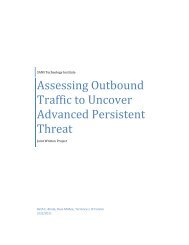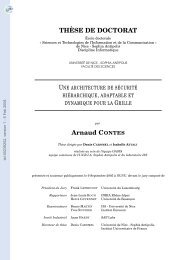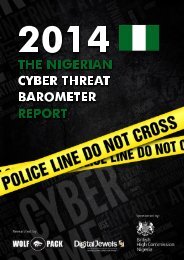gT4rH
gT4rH
gT4rH
You also want an ePaper? Increase the reach of your titles
YUMPU automatically turns print PDFs into web optimized ePapers that Google loves.
Introduction<br />
TEFO MOHAPI<br />
“I have seen very few countries in the world that have such inadequate educational<br />
conditions. I was shocked at what I saw in some of the rural areas and homelands. Education<br />
is of fundamental importance. There is no social, political, or economic problem you can solve<br />
without adequate education.”<br />
― Robert McNamara, ex-President of the World Bank, during visit to South Africa in 1982<br />
Advancement and innovation within Technology in Africa can only progress if underpinned<br />
by a solid foundation of Maths and Science education. As such, it is encouraging to see<br />
countries such as Kenya, Nigeria and Ghana continuing to innovate in the technology field,<br />
specifically in the field Information and Communications Technology.<br />
This alludes to a relatively good education system which stimulates the youth at a young age<br />
to have an interest in IT. Despite countries such as Kenya having far less resources,<br />
infrastructure and capital, than South Africa it continues to thrive as far as “home grown” IT<br />
solutions (mainly in mobile technology) are concerned. This can be seen further in the<br />
recent Vodacom continent wide mobile app developer competition where Kenyans won 1 st<br />
and 2 nd place, with a South African coming in third place.<br />
Not to mention that the South African who came in third place is white, this brings me to<br />
the crux of the matter. It is not about race but it is worrying that the future of Technology in<br />
South Africa doesn’t reflect the country’s demographics. Technology solutions to a<br />
community’s problems can only be effectively developed by those that have experienced<br />
the problem and are equipped with the necessary technology skills to develop solutions for<br />
them.<br />
Every year South Africa makes a spectacle about the “Matric Pass Rate” (Grade 12),<br />
furthermore in the foreword of the recent 2012 report, South Africa’s Basic Education<br />
Minister; Mrs. Angie Motshekga says “It is my proud privilege to announce the performance<br />
of learners who wrote the Annual National Assessment (ANA) during the week of 18–21<br />
September 2012.”










